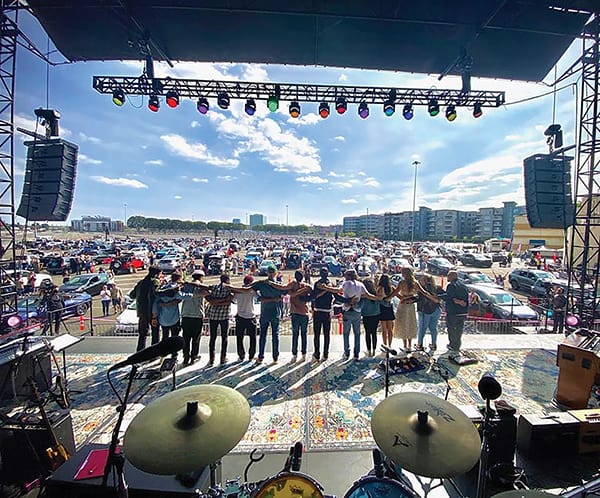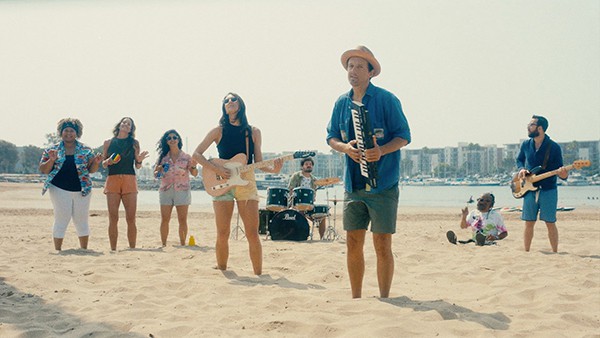By DJ Dave Hoffenberg
Jason Mraz is coming to the Green at Shelburne Museum Aug. 17. I had the pleasant surprise to find out it will be a 13-piece band. Wow, this is going to be an amazing show. I love his music. And Jason Mraz loves Vermont. He said, “Vermont in the summer is where it’s at.”

The new album, “Look For The Good,” is reggae-infused. Michael Goldwasser produced it and he’s at the forefront of the international reggae scene. The two of them met in 2018.
Mraz said, “He did a reggae remix for me. We hit it off. He asked if I would ever consider doing a whole reggae album? I said, ‘absofreakinlutely!’ I was already working on songs that I felt had the need for optimism in 2020. I thought Michael’s musical direction with reggae underneath these melodies was a perfect fit. Michael’s effects on songs like ‘Make Love’ and ‘My Kind,’ were exactly what the songs needed to uplift their message. It was a long time in the making and then all of a sudden, it was urgent.”
The show will be his songs in a reggae style with a little bit of storytelling in between, Mraz explained: “I try my best to guide the audience like it’s a yoga class. When you’re the front man, you’re responsible for crowd control. It’s my responsibility to lead that audience through a transformational journey from their head into their hearts. It’s just a good vibe show with dancing. Hopefully it’s warm and we’ll just be all sweating in the grass having a good time.”
I like his version of “I Melt With You” on the “50 First Dates” album. He said, “I would occasionally get invites to go have a tropical experience and that album was like that. I did a Mary Kate and Ashley Olsen movie that took me to Kingston, Jamaica to do a track with Sly & Robbie in 2004.”
He got to visit Bob Marley’s house and said, “It was actually the first time I got to visit a songwriter’s house. It really opened my eyes to songwriting life and band leader life, how he would bring his band and also take care of them at home. Have a studio in the backyard, grow their own food and grow their own music. It was very inspiring. I love the laid-back reggae vibes. Any time we visit a song from my catalog, minus 3 or 4 we would re-imagine a song in a reggae style, everybody felt great about it, the band and the audience.”

When Mraz was 21, he dropped out of college and moved from Richmond, Virginia to San Diego and started playing in coffee shops, open mics, sidewalks. He said, “There was this freedom of not knowing anyone, being obscure.”
When he was home, he was playing to friends and family.
“I want to play to a crowd of people who don’t know who the heck I am,” he added. “I want the songs to be appreciated, not me. That’s still to this day. I’d rather my songs be popular than myself.”
He did that for years before earning residencies in various clubs. He started getting a following and caught the attention of a record label after being played on local radio.
“We took the natural steps to build, a lot of club playing and opening for other bands,” he said.
His big break, so to speak, was playing a parking lot stage at The Gorge ampitheater in Washington state for fans waiting to get in to the show. Dave Matthews came out, listened to his music, jumped on stage and played a few tunes.
“It attracted basically everyone in the parking lot. It got written up in Rolling Stone,” he said.
After that more people were curious and came to his club dates. “One little thing after the next, we continued to have these little breaks that would take us up a level. Ever since then it’s just been this weird, wild, bonus,” he said. “At one point I thought I can just go back to the coffee shops because that’s always a good place. I can work on some new songs. I can still get the same high playing in a coffee shop as I would playing in Madison Square Garden.”
Jason Mraz has been touring for the last 20 years so being home during the pandemic was different but he stayed creative. As a kid, if he was sent to his room he would use his imagination to fill the time, he remembered. Today he was in a hotel room for the day and he said, “I’ve learned to be OK with that isolation and solitude. The last year I’ve nurtured curiosities and hidden talents, worked on my piano and wrote more songs.”
He has a small farm in his backyard that has become a business so there’s always tasks to do in agriculture, too. He said, “Any time I needed some earthing, I would step out in the backyard and join the farm team.”
He lives in San Diego so the farm never closes. Of the isolation caused by the pandemic, he added, “It’s a little overwhelming but a real gift to be there for a whole year. I can easily find beauty in the littlest things. I felt like I got to go to a retreat for a year and work on myself. I loved it.”
He said playing live is transformational. “Night after night I have to be OK with who I am and being stared at by 2,000 people. If I sometimes have a bad day and hit the stage with that bad day, I’m transformed by the experience. I’m humbled by it. Even if I have a good day and be blessed with a lot of new ideas on how to play songs I’ve played a hundred thousand times, I’m transformed because ideas are still being generated. I feel I’m given purpose when I go out there. I’m happy to serve through live music and hopefully the audience feels that.”



